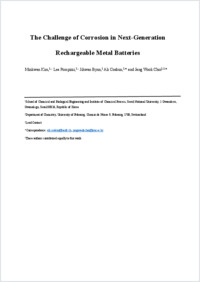The challenge of corrosion in next-generation rechargeable metal batteries
Université de Fribourg DOKPE
- Kim, Minkwan Seoul National University
- Pompizii, Lea University of Fribourg
- Byun, Jihwan Seoul National University
- Coskun, Ali University of Fribourg
- Choi, Jang Wook Seoul National University
- 2025
Published in:
- Chem. - ScienceDirect. - 2025, vol. 11, no. 8, p. 102661
English
Rechargeable metal-based batteries with the highest theoretical energy densities stand as highly promising candidates for next-generation energy storage devices. However, despite substantial progress in cycling reversibility, their calendar life remains critically undermined by persistent metal corrosion. This mismatch highlights corrosion as a distinct electrochemical process governed by an electron transfer pathway that differs fundamentally from that of operational cycling, particularly under non-operational (rest) conditions. Although corrosion-related studies have emerged across various battery chemistries, they have largely remained fragmented without a cohesive, in-depth understanding. In this perspective, we highlight ongoing debates surrounding corrosion phenomena and their mechanistic understandings, with particular emphasis on their critical implications for the calendar life. Building upon this expanded discussion, we integrate insights from existing corrosion suppression strategies and propose a spectrum of promising design principles—spanning metal electrode fabrication, surface modification, and electrolyte engineering—with the aim of fostering further developments in this important area.
- Faculty
- Faculté des sciences et de médecine
- Department
- Département de Chimie
- Language
-
- English
- Classification
- Chemistry
- Other electronic version
- License
-
Rights reserved
- Open access status
- green
- Identifiers
- Persistent URL
- https://folia.unifr.ch/global/documents/333346
Statistics
Document views: 43
File downloads:
- manuscript_final: 122
